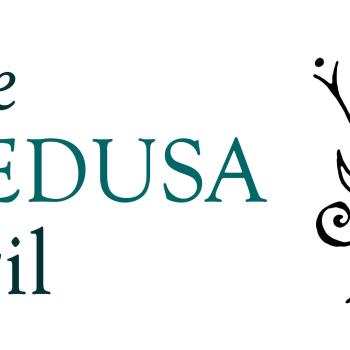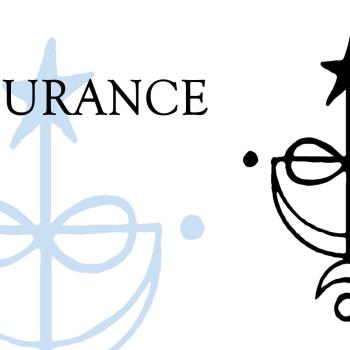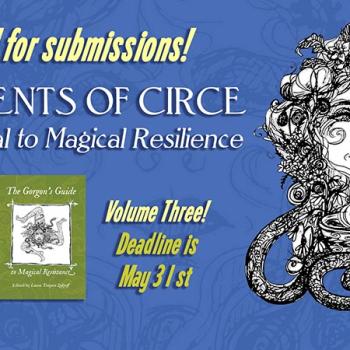 What does it mean to be authentic? Defined it means: “To be real, genuine, verified, representing one’s true nature or beliefs, to be true to oneself.”
What does it mean to be authentic? Defined it means: “To be real, genuine, verified, representing one’s true nature or beliefs, to be true to oneself.”
Notice the lack of “the oldest” or “the most cool” or “the most amount of decoration” there. No, rather we’re looking at what’s real, what works, what is true for that person.
In my workshop at Paganicon, “The Authentic Witch: Crafting A Working Tradition” – I discussed developing a practice that works best for YOU. Not what works for other people, or what other people think should work for you, but being honest with yourself.
Although the talk was 2 hours long (and me being me, I could keep going for twice that), I thought it would be helpful to condense it down to some key points on what is essential for crafting an authentic path.
1) Consider You: Who are you? What makes you, you? What are your strengths and weaknesses? If you know your background/heritage, what is it? (It’s not a detriment if you don’t know either). Are you looking to be a practitioner or are you better off as a participant? Are you looking at being a Witch as a vocation or a religion? One of the keys of Modern Traditional Witchcraft is “Know Yourself” (or Thyself if you want to get thee and thy). That means being realistic about who you are, who you’ve been up until this point, and where do you want to go. It means acknowledging both your talents and your failures. It means also looking at how Witchcraft is part of everything you do, versus something that’s a side compartment or hobby.

2) Inspiration: What are you most interested in when it comes to witchcraft and why? Is there a particular area that calls to you, such as herbalism, divination, the bardic arts, etc? Are there particular stories, myths, themes, and deities that keep appearing in your life? We are often drawn to certain things for a reason. Sometimes it’s because of our heritage, and sometimes it comes out of left field – from a culture or place you’re not familiar with, but it keeps repeating in your life. It’s important to take the time to examine these things and build a study program for yourself. That can mean travelling, reading books, investing in classes, etc. If something is not directly linked to you, but it calls to you, then you need to engage in serious study to understand and respect it. (True appreciation vs. appropriation.) Realistically, the same is true for any area of practice, whether it’s in your blood or not.
3) Location: Where are you physically located? What is the land like? Are you in the city, the suburbs, or out in the woods? In the plains, by the coast, by rivers or by oceans? What is the land like? It’s hard to practice a path rooted in a place you’ve never been to, with an entirely different climate or seasons than where you live. There’s nothing more powerful and engaging to connect to the land you actually live on – and even the concrete jungle has its own spirit and energy to it. Take time to connect to it, to identify the flow of the seasons, the plants, the animals, and the people. It’s so much easier to be in tune to the hum of the land where you live versus some place you don’t. Which also means, if you move to different places, your practice will change accordingly to reflect the nature of where you live.
4) Schedule: When do you work? When do you play? What time of year is most important to you? Is there a day or days with special meaning? In setting up a practice, you need to consider your availability, sleep patterns, and what has significance for you. You may like the Wheel of the Year construction, or you may find it has too few or too many days that don’t work. You don’t HAVE to do a thing at the Full Moon – but you may be drawn instead to a certain state of the waxing moon or the new moon. Or you maybe you just don’t feel a lunar connection at all. Consider what makes you feel like you’re part of a pattern, and helps you to acknowledge the passing of time. If you have a m/patron deity with a specific feast day that’s really important to you, then that will take precedence in your schedule versus some Sabbat that doesn’t resonate with you. If you only have 2 or 3 real seasons where you live, then marking those times will feel more important than a set of 4. If the solstices and equinoxes are really powerful symbolically for you, then those can be essential for your practice. What will you observe because it calls to you, not because you feel obligated.
5) Be Responsible: Why do you do what you do? What causes you to do it and why? Two more keys of the Modern Tradition are “Accept Responsibility” and “Maintain Balance.” There is no rede, no central code of morality or ethics. Instead we have an understanding that all of our actions have a multitude of reactions – with both positive and negative interpretations subject to perspective. So we must consider our words and actions, and the effects we can perceive them to have, then take action and accept responsibility for all that we can perceive – as well as those we can’t. We also understand that “Balance” is an idea, not a place. It’s always shifting, and sometimes it calls for extremes – and at other times it requires minute, delicate adjustments. Also, don’t be lazy, be honest to your practice and your calling.
6) Change: Be ever thinking, always considering, fluid and growing. Think outside of the box, out of the books, and exercise critical thinking. The Witch doesn’t assume, the Witch knows. Evaluate your path and your ideas regularly. Things we believe at one point in our lives may not work later-on, and vice versa. Discard what is unneeded and strengthen what works. If you are flexible enough to respond to the world around you, then you will be actively practicing and working. Sometimes we are the rock, and sometimes we are the water that swirls around the rock – and often we are both.
Notice I didn’t talk about magick or spellcraft, degrees or covens? Being a Witch isn’t just about using magick – plenty of people can do spells and metaphysics without being a Witch. Nor is a degree system or coven the only way to be a “real witch.” It’s definite *A* way, but it’s not necessarily THE way for everyone. There are numerous belief systems that believe that initiation comes through ancestral instruction or exploration of the spirit realms – devoid of any ceremonial magic system. Nor is the age of any system guarantee it’s going to be a good fit for you.
The authentic path of Witchcraft is the one that works.

















